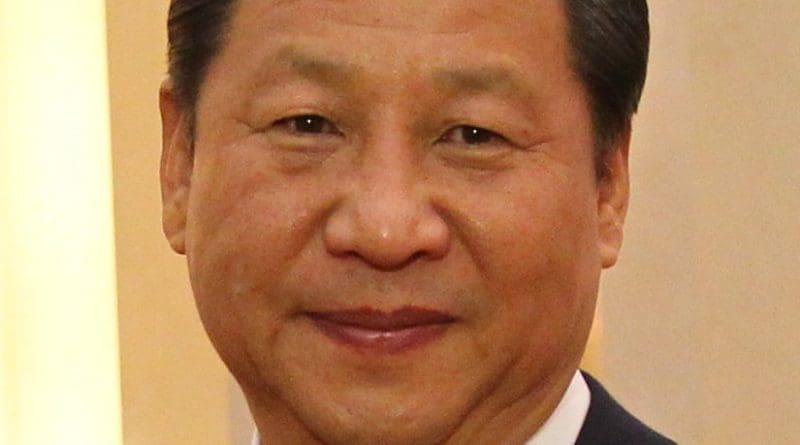Xi Jinping: ‘Cabals And Cliques’- Analysis
By SAAG
By Bhaskar Roy*
In a scathing speech to a plenary session of CPC Central Commission for Discipline Inspection (CCDI) in January this year, China’s President Xi Jinping, who is also the general secretary of the CPC Central Committee warned of “cabals and cliques” in the communist party, and the party’s fight against corruption, saying “it is not a ‘House of Cards’ power struggle” (Xinhua May 3, 2016).
According to the party controlled Global Times (May 4), Xi went on to say, “some officials have been forming cabals and cliques to covertly defy the CPC Central Committee’s decisions and policies,” and that they, “risk compromising the political security of the party and the country”. He also sarcastically remarked that some officials also manipulate power and enter Zhongnanhai – the headquarters of the party and the state council – so that when they die they will be rested at Babaoshan Cemetery meant for famous people. Xi vowed to expel “two-faced” party members who promised to fight corruption but never reported problems. This means there are people who may not be personally corrupt but abetted corruption for some reasons.
There are a few points to ponder in Xi Jinping’s speech to the CCDI as reported in the Chinese official media. First, why was an important speech delivered in January disclosed to the public and the international community only in May, after a delay of over three months? January was the point when Xi further reinvigorated his anti-corruption campaign. To outside observers, January would have been the apt time to release the speech to have an immediate impact. But it was not done.
There must have been some very important reasons. In the seven member Politburo Standing Committee, three members, Zhang Dejiang, Liu Yunshan, and Zhang Gaoli are former powerful proteges of Party Chief Jiang Zemin. Premier Li Keqiang, who stands at number two in the hierarchy after Xi, is a product of the Communist Youth League (CYL), a powerful body, and a crucible for future top leaders. Xi recently launched an exercise to reorganize or clean up the CYL – could they and their acolytes in the Central Committee have resisted publication of the speech?
The speech that has been published now is only extracts of the original speech. The published portion is scathing enough. Is there some more innuendos in the original speech, pointing fingers at Jiang Zamin and his favoured persons or relatives of leaders past and present? If so, resistance would have been strong.
The use of the American television serial “House of cards” seems to be becoming a reference even at the highest levels in China. The serial depicts the dirty games that are played for high level politics. Although the serial is about America, it has its effect on people across the world and the phenomenon is found wherever there is politics and power play. With the internet, the serial is available to many in China. Why is the all-powerful Xi Jinping smarting about it? It must have touched a raw nerve in Xi. Without being asked he is protesting. Why?
Obviously, there are huge problems. When Chinese leaders protest without being accused, there is an attempt at cover up. It appears that he is going at opponents with a sledge hammer as well as with deft machinations.
Warning the “cabals and the cliques” is not unexpected. The cabals and cliques are not new to the Chinese Communist Party or China. These are a part of Chinese history and culture, as it has been part of court politics in other parts of the world. The word ‘cabal’, after all, comes from British Monarchic history, of a conspiracy of five noblemen against the throne.
In China, however, it is known as Guanxi, and its roots go down very deep. An official in a particular chain will oppose even his superior to carry out the directions of his own mentor. These chains are difficult to break. When the storm comes, they will lie low and even pretend to be in tune with the power that be, but the loyalty does not really change. Jiang Zemin had established very strong “cabals” or “Guanxi”, who remained loyal to him and worked against Xi. The major ones who were well known have been demolished by Xi through his anti-corruption campaign. This has won him appreciation from many people in China.
The common people and intellectuals had become very critical of corruption at high levels and their lavish life styles. This snowballed into a high threat to the legitimacy of the party. The fear at the top level, especially that of Xi, was if the party imploded then even the country’s integrity would be at risk and his “Chinese Dream” could collapse. Corruption became an existential threat to China, especially the CPC. If the party collapsed, where would the party’s top and hard-line leaders go? The official Chinese think tanks have deeply studied the fate of hard-line leaders following the Soviet Communist Party and that of its client states in the Warsaw Pact.
On the other hand, Xi is building his own cabal. At the 19th party congress in 2007, most opponents would have retired, eased out or punished. The new Politburo Standing Committee will have five new members mostly handpicked by Xi. The only one remaining would be Premier Li Keqiang, significantly weakened.
Then Xi will have to worry about the 20th Party Congress in 2022, when he is scheduled to retire. Will he change the current rules and practice? It is said China is ruled by law, but that law is Xi Jinping’s law. If Xi tries to extend his tenure to the power centre for life like Mao Zedong had, there could be huge problems. Like the Mao era ‘Gang of Four’ Xi’s “Gang” of so many not yet identified may suffer a difficult situation.
*The writer is a New Delhi based strategic analyst. He can be reached at e-mail [email protected]

